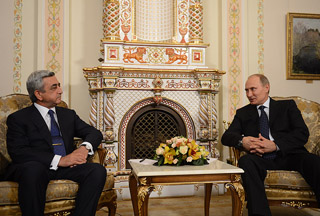Armenia is still creating imitation for association

During yesterday’s parliamentary session deputies were trying to understand how it could happen that Armenia was in negotiation with Europe during four years for the purpose of signing association agreement, and just two months before that drastically made a political decision to join Customs Union proposed by Russia and other post-Soviet states.
The former foreign minister also asked to explain how could the government bring a bill on association agreement with Europe to the parliament and in a short while take steps toward joining Customs Union. Incumbent foreign minister Edward Nalbandyan said nothing had been changed, only some corrections had been made to the draft bill. Alexander Arzumanyan still insisted saying that even in case of such changes the government had to bring a new bill to the parliament, otherwise it would have to resign.
Edward Nalbandyan did not answer whether Armenia was going to participate in the Eastern Partnership gathering in Vilnius in November, and whether any document would be signed there. Instead, the foreign minister said that Armenia would continue talks with Europe as much as Europe would allow and to the extent it is not against Armenia’s decision to join the Customs Union.
In fact the foreign minister or anybody else do not know whether Armenia will be invited to participate in the Eastern Partnership summit in Vilnius. According to the current situation, it is highly possible that Armenia will not be even invited, however we still hope there will be invitation.
According to our information, foreign minister Edward Nalbandyan is trying to convince European officials to let Armenia participate in the summit in Vilnius and sign a declarative document there. Such document will not have any serious content and will not jeopardize Armenia’s integration with Customs Union. The proposed document will contain general commitments to be taken by Armenia such as improvement of human rights protection, fight against corruption and democratic elections.
By signing such document Armenia will be able to demonstrate commitment to its policies and say that it is implementing a complementary policy. If Armenia does not sign any documents with Europe, it will not be a complementary policy anymore; it will be an “either, or” policy. In other words, failure to sign anything with Europe will demonstrate that Armenia is not governed by its political agenda but is manipulated.
The Armenian government’s policy of pursuing commitment to enable Armenia sign such agreement is not successful. Shortly foreign affairs ministers and education ministers of the Eastern Partnership countries will come to Armenia to participate in an event, which may be a good chance for the Armenian government to demonstrate high level relations with Europe, but it is not guaranteed as these two events had been planned before Armenia’s decision to give up on the association agreement with Europe. Maybe European officials do not want to cancel these events in Yerevan to escape from any possible diplomatic scandals, or they simply do not want to give up on relations with Armenia yet. European officials do not want to announce yet that Armenia’s policy toward European integration has failed. Europeans understand that if Armenia was able to “play” with them during the past four years, and if they allow Armenia to sign a document with them in Vilnius, it will show that Armenia can continue “playing” the same way.
Europeans have announced that they are against the policy of “both benefits,” thus hardly may it be possible to manipulate this process. The only thing that seems to be possible now is an Armenian representative’s participation in the summit in Vilnius but without signing any documents.
By Avetis Babajanyan




















